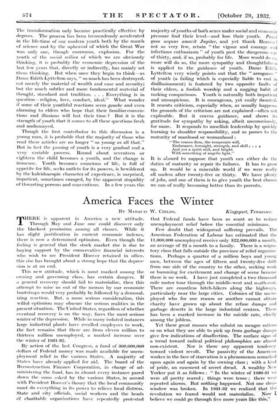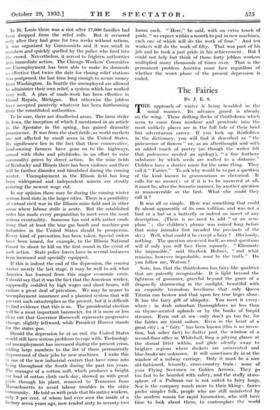America Faces the Winter
THERE is apparent in America a new attitude. Through May and June one could discover only the blackest pessimism among all classes. While it has slight justification in current economic indexes, there is now a determined optimism. Even though the feeling is general that the stock market rise is due to buying support by the conservative financial interests who wish to see President Hoover retained in office, this rise has brought about a strong hope that the depres- sion is at an end.
This new attitude, which is most marked among the owning and governing class, has certain dangers. If a general recovery should fail to materialize, then this attempt to raise us out of the morass by our economic bootstraps would very probably be followed by a demoral- izing reaction. But, a more serious consideration, this wilful optimism may obscure the serious realities in the present situation. The United States, regardless of whether eventual recovery is on the way, faces the most serious winter of the depression. While in many isolated instances large industrial plants- have recalled employees to work, the fact remains that there are from eleven million to thirteen million unemployed, a marked increase over the winter of 1981-82.
By action of the last Congress, a fund of 300,000,000 dollars of Federal money was made available for unem- ployment relief in the various States. A majority of States have already applied for aid. The board of the Reconstruction Finance Corporation, in charge of ad- ministering the fund, has in almost every instance pared down the sums asked by the various States, in accord. with President HoOver's.theory that the local community must do everything in its power to relieve local distress. State • and city officials, social workers and the heads of charitable organizations have repeatedly protested that Federal funds have been so scant as to reduce unemployment relief below the essential minimum.
Few doubt that widespread suffering prevails. The American Federation of Labour has estimated that the 11,000,000 unemployed receive only $22,000,000 a month, an average of $2 a month to a family. There is a migra- tory class that falls outside the province of relief organiza- tions. Perhaps a quarter of a million boys and young men, between the ages of fifteen and twenty-five drift from one side of the country to the other, seeking work or bumming for excitement and change of scene because there is no work. I have just completed a two thousand mile motor tour through the middle-west and south-east. There are countless hitch-hikers along the highways, particularly near the large cities. Colonies of the unem- ployed who for one reason or another cannot obtain charity have grown up about the refuse dumps and garbage deserts in the large industrial centres. There has been a marked increase in the suicide rate, chiefly among the jobless.
Yet these great masses who subsist on meagre rations or on what they are able to pick up from garbage dumps give few indications of disaffection. • The surface signs of a trend toward radical political philosophies are almost non-existent. Nor is there any apparent tendency toward violent revolt. The passivity of the American worker in the face of starvation is a phenomenon remarked upon again and again by the owning class ; with a kind of pride, an easement of secret dread. A wealthy New Yorker put it as follows : " In the winter of 1980-31 we were all pretty scared ; things were tense ; there were repeated alarms. But nothing happened. Not one shop- window was broken. In 1931-32 we realized that the revolution we feared -would not materialize. Now I believe we. could go through five more years like this,". In St. Louis there was a riot after 17,000 families had been dropped from the relief rolls. But it occurred only after they had gone for two weeks without rations, it was organized by Communists and it was small in numbers and quickly quelled by the police who fired into the crowd. Nevertheless, it served to frighten authorities into immediate action. The Chicago-Workers' Committee on Unemployment has been able to make its demands so effective that twice the date for closing relief stations was postponed, the last time long enough to secure money from Washington. In Seattle the unemployed are allowed to administer their own relief, a system which has worked very well. A plan of made-work has been effective in Grand Rapids, Michigan. But otherwise the jobless have accepted passively whatever has been forthcoming from the constituted authorities.
To be sure, there are disaffected areas. The farm strike in Iowa, the inception of which I mentioned in an article in the Spectator in the spring, has gained dramatic prominence. It was from the start futile, as world markets are not affected by small areas in the United States. Its significance lies in the fact that these conservative, land-owning farmers have gone on to the highways, armed with clubs and pitchforks, in an effort to raise commodity prices by direct action. In the mine fields of Kentucky and Illinois there has been violence and there will be further disorder and bloodshed during the coming winter. Unemployment in the Illinois field has long been widespread and independent miners are stoutly resisting the newest wage cut.
In my opinion there may be during the coming winter serious food riots in the larger cities. There is a possibility of virtual civil war in the Illinois mine field and in other areas where labour strife is acute. But the established order has made every preparation to meet even the most serious eventuality. Someone has said with rather crude irony that at least the tear gas bomb and machine-gun industries in the United States should be prosperous. Every kind of precaution has been taken. Special orders have been issued, for example, to the Illinois National Guard to shoot to kill on the first round in the event of mob action. State police forces have in several instances been increased and specially equipped.
If this is indeed the end of the depression, the coming winter merely the last stage, it may be well to ask what America has learned from this major economic crisis. I should say that it was the fact that the American worker, supposedly coddled by high wages and short hours, will endure a great deal of privation. We may be nearer to unemployment insurance and a planned system that will prevent such catastrophes as the present, but it is difficult to find evidence that this is so. The presidential election will be a most important barometer, for it is more or less clear cut that Governor Roosevelt represents progressive change, slightly leftward, while President Hoover stands for the status quo.
Should the depression be at an end, the United States would still have serious problems to cope with. Technologi- cal unemployment has increased during the present crisis, adding large numbers to the list of those permanently dispossessed of their jobs by new machines. I write this in one of the new industrial centres that have come into being throughout the South during the past ten years. The manager of a cotton mill, which produces a freight car load of cotton cloth each day, showed us with great pride through his plant, removed to Tennessee from Massachusetts to avoid labour troubles in the older community. He told us with pride that his native workers, only 2 per cent. of whom had ever seen the inside of a factory seven years ago, now tended sixty to seventy-two looms each. " Here," he said, with an extra touch of pride, " we expect within a month to put in new machines, each one of which will do the work of four." And ten workers will do the work of fifty: That was part of his job and he took a just pride in his achievement. But I could not help but think of those forty jobless workers multiplied many thousands of times over. That is the permanent problem America must face regardlesi of whether the worst phase of the present depression is ended.













































 Previous page
Previous page